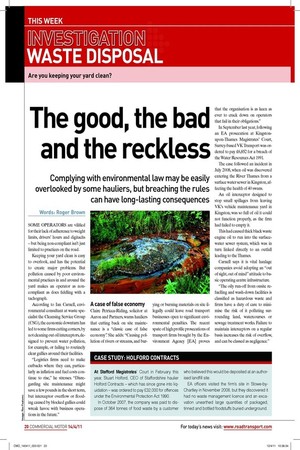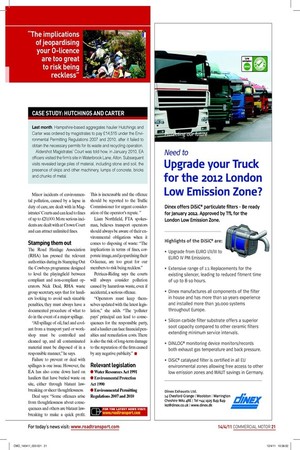The good, the bad and the reckless
Page 14

Page 15

If you've noticed an error in this article please click here to report it so we can fix it.
Complying with environmental law may be easily overlooked by some hauliers, but breaching the rules can have long-lasting consequences
Words: Roger Brown
SOME OPERATORS are viliied for their lack of adherence to weight limits, drivers’ hours and digitachs – but being non-compliant isn’t just limited to practices on the road.
Keeping your yard clean is easy to overlook, and has the potential to create major problems. But pollution caused by poor environmental practices in and around the yard makes an operator as noncompliant as does iddling with a tachograph.
According to Ian Carnell, environmental consultant at waste specialist the Cleansing Service Group (CSG), the economic downturn has led to some irms cutting corners, by not cleaning out oil interceptors, designed to prevent water pollution, for example, or failing to routinely clear gullies around their facilities.
“Logistics irms need to make cutbacks where they can, particularly as inlation and fuel costs continue to rise,” he stresses. “Disregarding site maintenance might save a few pounds in the short term, but interceptor overlow or looding caused by blocked gullies could wreak havoc with business operations in the future.”
A case of false economy
Claire Petricca-Riding, solicitor at Aaron and Partners, warns hauliers that cutting back on site maintenance is a “classic case of false economy” . She adds: “Causing pollution of rivers or streams, and bur ying or burning materials on site illegally could leave road transport businesses open to signiicant environmental penalties. The recent spate of high proile prosecutions of transport irms brought by the Environment Agency [EA] proves that the organisation is as keen as ever to crack down on operators that fail in their obligations.” In September last year, following an EA prosecution at Kingstonupon-Thames Magistrates’ Court, Surrey-based VK Transport was ordered to pay £6,852 for a breach of the Water Resources Act 1991.
The case followed an incident in July 2008, when oil was discovered entering the River Thames from a surface water sewer in Kingston, affecting the health of 40 swans.
An oil interceptor designed to stop small spillages from leaving VK’s vehicle maintenance yard in Kingston, was so full of oil it could not function properly, as the irm had failed to empty it.
This had caused thick black waste engine oil to run into the surfacewater sewer system, which was in turn linked directly to an outfall leading to the Thames.
Carnell says it is vital haulage companies avoid adopting an “out of sight, out of mind” attitude to basic operating centre infrastructure.
“The oily run-off from onsite refuelling and wash-down facilities is classiied as hazardous waste and irms have a duty of care to minimise the risk of it polluting surrounding land, watercourses or sewage treatment works. Failure to maintain interceptors on a regular basis increases the risk of overlow, and can be classed as negligence.” Minor incidents of environmental pollution, caused by a lapse in duty of care, are dealt with in Magistrates’ Courts and can lead to ines of up to £20,000. More serious incidents are dealt with at Crown Court and can attract unlimited ines.
Stamping them out
The Road Haulage Association (RHA) has pressed the relevant authorities during its Stamping Out the Cowboys programme designed to level the playingield between compliant and non-compliant operators. Nick Deal, RHA waste group secretary, says that for hauliers looking to avoid such sizeable penalties, they must always have a documented procedure of what to do in the event of a major spillage.
“All spillage of oil, fuel and coolant from a transport yard or workshop must be controlled and cleaned up, and all contaminated material must be disposed of in a responsible manner,” he says.
Failure to prevent or deal with spillages is one issue. However, the EA has also come down hard on hauliers that have buried waste on site, either through blatant lawbreaking or sheer thoughtlessness.
Deal says: “Some offences arise from thoughtlessness about consequences and others are blatant lawbreaking to make a quick proit. This is inexcusable and the offence should be reported to the Trafic Commissioner for urgent consideration of the operator’s repute. ” Liam Northield, FTA spokesman, believes transport operators should always be aware of their environmental obligations when it comes to disposing of waste: “The implications in terms of ines, corporate image, and jeopardising their O-licence, are too great for our members to risk being reckless.” Petricca-Riding says the courts will always consider pollution caused by hazardous waste, even if accidental, a serious offence.
“Operators must keep themselves updated with the latest legislation,” she adds. “The ‘polluter pays’ principal can lead to consequences for the responsible party, and a haulier can face inancial penalties and remediation costs. There is also the risk of long-term damage to the reputation of the irm caused by any negative publicity.” ■









































